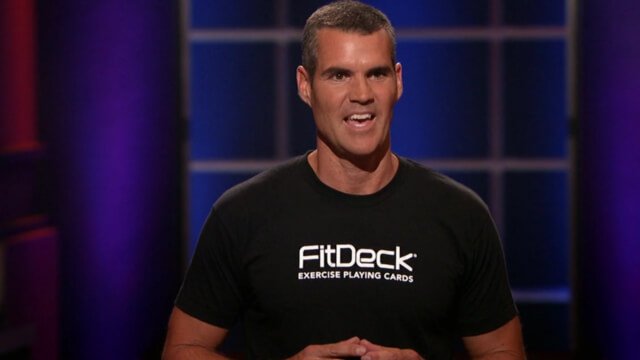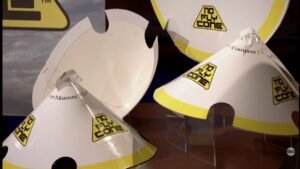You know the cliché: They got a deal on Shark Tank, became millionaires overnight, and lived happily ever after! Reality? It’s messier, grittier, and—honestly—a lot more interesting. FitDeck, Inc. is that case study. Let’s walk through what really happened when Phil Black faced the Sharks, what’s up with FitDeck’s net worth, and whether the smart money is on a pitch, a pivot, or just keeping your head down and hustling.
Contents
ToggleWho Actually Runs This Show? Meet Phil Black
Founders matter. With FitDeck, you don’t just get another fitness bro hawking gear. Phil Black is tougher than most—Yale guy, Harvard MBA, Navy SEAL, dad of four, and a serial entrepreneur who’s tasted both wins and rejections. He’s the kind of founder most investors beg for—because if he can’t figure it out, there probably isn’t an answer.
Phil wasn’t just another smooth-talker walking into Shark Tank. He brought stats. He’d built FitDeck from scratch and knew his numbers cold. I’ve seen founders bluff on market size or viral growth—not this guy. That’s rare, and it gets my respect.
The Simple Genius of FitDeck—Why It Worked Before Fitness Apps Ruled
Before apps took over, FitDeck did something basic and brilliant. Shuffle a deck of cards, each showing a bodyweight move. Now you’ve got a workout and, more importantly, zero excuses. No gym. No trainer. No complicated setup. You pull a card, you hustle, you sweat. Repeat. Old school? Yep. But sometimes that’s exactly why people loved it.
FitDeck didn’t stop at one deck. It went niche. Yoga? There’s a deck. Lacrosse conditioning? They had that too. New moms? Baby stroller workout deck. This is what sets founders apart—knowing your audience and making the product feel like it was built just for them.
Real talk: I love tech, but sometimes digital fatigue is real. FitDeck was the answer for the analog diehards who didn’t want another login or subscription draining their willpower.
The Shark Tank Pitch: Guts, Numbers, and the Hard Truth
Season five, episode fifteen—Phil Black walks into the Tank with a box of cards and big numbers. He’s asking for $300,000 for 20% of the company. That’s a $1.5M valuation. Sounds reasonable, right?
Reality check. Phil tells the Sharks FitDeck has already done $5 million in lifetime sales, with over 500,000 decks out in the wild. They did $640,000 in sales in the year before the show. Cost per deck? $2. Retail price? $15. That’s the kind of margin founders dream about.
But numbers can be brutal. Zero profit the year before Shark Tank. I’ve seen founders hide this in fancy charts. Phil put it all out there—honest, but also a red flag for any investor. If you can’t make money with margins that fat, where’s the leak?
The Sharks—Mark Cuban, Daymond John, Robert Herjavec, Lori Greiner, Kevin O’Leary—were all watching the same thing I saw: crowded market, potential for digital disruption, and questions about whether a deck of cards could really hold its ground in the age of fitness apps.
Why don’t you just make these digital?
Phil had no smoke and mirrors. He admitted that the jump to digital wasn’t easy and there were growing pains. That’s real-world founder talk. But for the Sharks, and anyone who’s built to scale, they want to bet on simple growth levers or tech moats. In this business? Neither was obvious.
End of pitch: no deal. Not one Shark takes a swing.

Is FitDeck Worth Anything Now? The $5 Million Question
Here’s what most viewers miss. Walking out with no deal doesn’t mean your business is dead. FitDeck kept grinding. In fact, the brand was acquired by Implus—a big fish in the fitness accessory world—just months after hitting TV.
So by 2025, FitDeck is still sitting on a net worth of about $5 million. That’s not wild, Bombas-level money, but remember: no TV deal, no celebrity endorsements, just steady sales and takeover by a bigger player.
What does that number really say? A smart, focused brand can last. The founder got his payout, and the business lived on. If you’re a hustler dreaming of building something that lasts long enough to get acquired, take notes.
After Shark Tank: Implus Steps In (Here’s How Exits Really Work)
I hear this from new founders all the time: If I just get on Shark Tank, the world will come calling. The trick is you’ve got to be worth the call even after the cameras shut off.
Implus saw value in the FitDeck brand, even if the Sharks balked. The company gobbled up FitDeck to add another feather in their fitness portfolio. For Phil Black, this was the payout moment. Did he get a massive check? Maybe not headline money, but enough to bank a win and move to the next thing.
This kind of exit—selling to a strategic buyer—is what happens when you solve a real problem, keep your product simple, and build an audience who won’t shut up about you on fitness forums.
Is FitDeck Alive Today, or Just Fitness Nostalgia?
Where’s FitDeck now? Here’s the straight answer—FitDeck is still on the market, living under the Implus umbrella. Classic decks still sell through Amazon and fitness retailers, but don’t expect a flood of new products. Implus focuses on what works and lets the old hits play.
So if you see a FitDeck on a shelf, it’s not because of constant innovating since the acquisition. It’s because the original concept still sells, even in a sea packed with fitness apps and wearables.
Is the brand going viral on TikTok? No. Is it quietly earning revenue for its new owners? Absolutely.

Phil Black’s Next Act: From Cards to College Prep
This is where real operators stand out. After selling FitDeck, Phil didn’t ride off into the sunset. He doubled down on a new vision: PrepWell Academy. Now, he’s helping teens prep for college, tests, and life decisions—different market, same relentless focus.
If you’re the kind of founder who can walk away from a business, cash out, and then tackle something totally new? That’s hustle. Too many founders get addicted to their first idea. Phil bet on himself, not just his business, and that’s the move every smart entrepreneur should learn.
Lessons from the FitDeck Hustle: Wins, Fails, and the Takeaway for Founders
Let’s keep it real. FitDeck didn’t become a household name. But it didn’t bomb, either. The wins? Grinding out $5M+ in sales, owning your niche, and exiting without a single Shark’s money. The fails? No digital moat, slow profit growth, and a saturated market that even the strongest hustlers can’t always outrun.
My advice? Obsess over your margins, own your audience, but don’t get tunnel vision on going digital just because the crowd says so. FitDeck proves you can start analog and still win—if you’re smart and stubborn enough for the long play.
If you want Shark Tank breakdowns that aren’t full of fairy tales, SharkWorth will always give you the verdict: Sometimes, losing on TV is exactly how you win in real life.
Frequently Asked Questions
Is FitDeck, Inc. still in business after Shark Tank?
Yes—FitDeck was acquired by Implus within a year and still operates as part of their fitness product lineup.
Can I still buy FitDeck cards now?
You bet. Classic FitDeck decks are sold on Amazon and through select fitness and online retailers. Stock levels change, but they’re out there.
Did any of the Sharks regret passing on FitDeck?
No Shark has publicly said they regret it. With no viral explosion or new hit products, it made sense from their risk profile.
Who owns FitDeck, Inc. today?
Implus, a major fitness accessories company, owns and manages the FitDeck brand since the acquisition.
How much profit did FitDeck make after the show?
Lifetime sales pass $5M, but profits stayed lean. The business eventually found its payday through the exit to Implus.
What is Phil Black working on now?
Phil Black runs PrepWell Academy, a college prep program for teens and their parents.
How is FitDeck different from fitness apps?
No screen, no subscription pressures. It’s tangible, simple, and appeals to people who just want a no-fuss workout.
Was not getting a deal on Shark Tank good or bad for FitDeck?
In the end, it was good. Exposure led to the Implus deal—which was the better outcome versus giving up equity to the Sharks.
Are there new FitDeck products since the acquisition?
No big launches since the buyout. Implus sells the classics, keeping the brand alive without new cards flooding the shelves.
Here’s the final word—if you think a Shark Tank deal is the only way to win, think again. FitDeck proved you can walk off set with nothing but your product and your reputation, still carve out a successful exit, and have cash in the bank. Sometimes, the smartest gamble is betting on yourself—and knowing when to hand off the cards and move on to your next big thing.
If you want more Shark Tank insights stripped of fluff, keep it locked to SharkWorth. We’ll tell you who’s swimming—and who’s just treading water.










